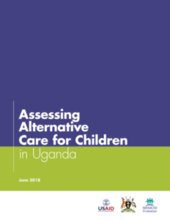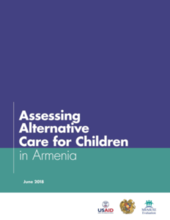Displaying 211 - 220 of 576
The purpose of this systematic review is to compare the associations of kinship care and non-kinship care with children's mental health and to examine the factors associated with children's mental health in kinship care and non-kinship foster care.
This report presents the findings from an assessment workshop aimed at informing action planning to address high-priority needs identified in alternative care for children in Uganda.
This report presents the findings of an assessment workshop aimed at informing action planning to address priority needs identified in alternative care for children.
This report presents the findings of an assessment workshop aimed at bringing together key stakeholders—decision makers, policy developers, service providers, civil society representatives, and donors—to assess and identify the main care reform areas in Armenia in which action is needed.
This bulletin highlights supports and services for kinship caregivers, training for caseworkers and caregivers, and examples of successful kinship care programs.
This report, in the Moldovan lanugage, presents the findings of an assessment workshop aimed at informing action planning to address priority needs identified in alternative care for children in Moldova.
This report, in Armenian, presents the findings of an assessment workshop aimed at bringing together key stakeholders—decision makers, policy developers, service providers, civil society representatives, and donors—to assess and identify the main care reform areas in which action is needed.
This report, in the Moldovan langauge, presents the findings of an assessment workshop aimed at informing action planning to address priority needs identified in alternative care for children in Moldova.
This report presents the findings of an assessment workshop aimed at informing action planning to address priority needs identified in alternative care for children in Moldova.
This paper draws on the perspectives of foster and kinship carers, describing the disconnection between their role as mental health advocates and their interest in early intervention in a field which is dominated by crisis and the historic marginalisation of foster and kinship carers.








